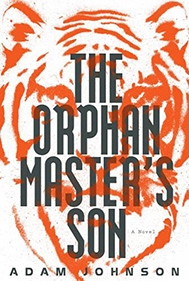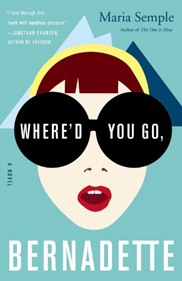by David Abrams
Buy on NOOK »-
March 8, 2013
Opening Round
-
Adam Johnson
2The Orphan Master’s Son
v.
3Where’d You Go, BernadetteMaria Semple
-
Judged by
Elliott Holt
I read both of these novels while on vacation last August and fell in love with them for different reasons. I recommended Where’d You Go, Bernadette to just about everyone. It’s a delightful satire that is also a moving mother-daughter story. The Orphan Master’s Son is also smart satire—though its subject matter, North Korea, is not an easy sell—and I pressed it on friends who love ambitious novels like David Mitchell’s Cloud Atlas as much as I do. These were two of the best books I read in 2012, so when I found out that I would be judging the opening round match between them, I reread both.
Where’d You Go, Bernadette is narrated by the precocious Bee, an eighth-grader whose mother (the eponymous Bernadette) has disappeared. Bee reconstructs the events, and in addition to her hilarious commentary, the mystery is told through school report cards, letters, bills, and emails (many of them from Bernadette to the virtual assistant she’s hired in India). Bernadette hates Seattle, where she and her husband (a Microsoft bigwig whose TED talk is the “fourth most watched”) moved from Los Angeles 15 years earlier, and she also hates the “gnats,” the fellow parents at Bee’s “second-tier” private school. Her fear of people keeps her home most of the time, ranting on the internet, but in addition to being a snobby shut-in, she’s a brilliant architect who abandoned her award-winning career when she fled LA after the “Huge Hideous Thing.” (Read the book to find out what happened.) Bernadette may be having a breakdown, but she’s a winning character with an irresistible narrative voice. Here she is venting about Seattle in an email:
A guy named the Tuba Man, a beloved institution who’d play his tuba at Mariners games, was brutally murdered by a street gang near the Gates Foundation. The response? Not to crack down on gangs or anything. That wouldn’t be compassionate. Instead, the people in the neighborhood redoubled their efforts to “get to the root of gang violence.” They arranged a “Race for the Root,” to raise money for this dunderheaded effort. Of course, the “Race for the Root” was a triathlon, because God forbid you should ask one of these athletic do-gooders to partake in only one sport per Sunday.
Maria Semple’s large cast of characters includes everyone from Ollie Ordway, the consultant hired by Bee’s school whose emails include bolded marketing speak (“Our objective is to move the needle on Galer Street and kick it up into the First-Choice Cluster (FCC) for Seattle’s elite”); a blackberry bush “abatement specialist”; and Bernadette’s principal foils, both “Galer Street gnats”: Soo-Lin Lee-Segal, the nosy, striving Microsoft admin who works with Bernadette’s husband, Elgie; and Audrey Griffin, who lives next door. Bee loves her mother and wants to understand her; at its core, this is a book about identity and love. The book is fast-paced and compulsively readable (I devoured it in one sitting) and beneath its nimble storytelling is a resonant exploration of a mother and daughter’s unbreakable bond.
The Orphan Master’s Son is a daring literary feat: It imagines North Korea during Kim Jong-il’s rule. Adam Johnson brings the intense suffering of the North Korean people to life, but the real brilliance lies in the way he explores the struggle to control narrative. In North Korea, “you don’t get to tell people’s stories, the state does,” and Johnson’s novel is structured around that tension. It follows a single citizen, Jun Do (a homonym of John Doe), an orphan whose entire life is defined by reinvention. (Like in Where’d You Go, Bernadette, love and identity are prominent themes.) His story is told through absurd propaganda broadcasts over the loudspeakers in every North Korean home; through his biography (the novel implicitly asks who the author of this biography is); and in the first-person accounts of an unnamed employee of “Division 42” (an Orwellian place where citizens are interrogated) who writes official citizen biographies. The novel is often hilarious. In the New York Times Book Review, Christopher R. Beha argued that Johnson’s book is too much “fun” given its serious subject matter, but I disagree. The absurdity conveys the inherent dishonesty of the North Korean regime. The official narrative is so at odds with reality that it underscores the brutal truth. Division 42 relies on a torture machine called the autopilot:
The autopilot works in concert with the mind, measuring output, responding to alpha waves…Think of it as probing a conversation with the mind, imagine it as a dance with identity. Yes, picture a pencil and an eraser engaged in a beautiful dance across the page. The pencil’s tip bursts with expression—squiggles, figures, words—filling the page, as the eraser measures, takes note, follows the pencil’s footsteps, leaving only blankness in its wake…They continue in lockstep this way, the self and the state, coming closer to one another until finally the pencil and the eraser are almost one, moving in sympathy, the line disappearing even as it’s laid down, the words unwritten before the letters are formed, and finally there is only white.
Johnson’s novel works like the autopilot: As the book progresses, the self and the state (with its farcical narratives) come closer to one another, whitewashing the individual experience. The book interrogates the narrative even as it proclaims the importance of individual stories. Provocative and genuinely moving, it was even more dazzling the second time I read it. Where You’d Go, Bernadette is a fun read, but The Orphan Master’s Son is a fun read that’s also a haunting one. It’s a reminder of what fiction has the power to do: Change the way you see the world. It’s a book that warrants close reading (by everyone) and it’s one that we’ll still be reading 50 years from now. And it’s the clear winner in this round. Where’d You Go, Bernadette can’t compete with the ambition and scope of The Orphan Master’s Son.
Match Commentary
By Kevin Guilfoile & John Warner
Kevin: This is really the first year in the ToB that you and I have multiple connections, casual and not, to the contenders. I attribute this simply to getting older. We sometimes travel in writerly circles, which aren’t always large, and our cohort is starting to come into its own in terms of popularity and critical acclaim. It was inevitable that this would happen. Throughout the tourney, we’ll be talking a little in the commentary about these potential conflicts, both because our personal experience might be constructive and because people have a right to know. Obviously cronyism, clout, and fraternity have sometimes had an impact on arts awards. While we try to ensure the judging is as fair as possible, people should be free to make that determination for themselves.
I read The Orphan Master’s Son at the beginning of the year. It might have been the first book I read in 2012. And I remember emailing you right away, telling you how excited I was about it. If I read five books this year as good as this one, I think I said, it will be the greatest year of reading I ever had.
You hadn’t read it yet, but it was during that conversation that you told me for the first time that you went to grad school with Adam Johnson.
John: Adam was a year ahead of me in the MFA program at McNeese State University. He’s one of the people I shot pool with when I visited campus prior to committing. He fed me red beans and rice while we watched a Suns playoff game the same night. For two years after that, we lived inside the same world, a small world at that. It’s not the military, but if it was, we shared a foxhole (or since this was Louisiana, a nutria den).
Which is to say, my objectivity is compromised when it comes to commenting on Adam’s work.
Except, not entirely. I don’t think The Orphan Master’s Son is a brilliant novel because Adam and I are friends. I think it because I believe it to be true, but I don’t necessarily expect everyone to trust me on that.
I’m not sure why, but it brings to mind one of last year’s lit-world kerfuffles that I filed away so I could raise it here with you and the commentariat.
I’m talking about Jacob Silverman’s essay at Slate, “Against Enthusiasm,” in which he is critical of what is described as an “epidemic of niceness” in online book culture. One of the realities of social media is that we come to “know” many more writers than we used to, and in so doing, perhaps tamp down the likelihood of saying something negative about another’s work. Silverman detects a culture of “liking,” where the primary mode of discourse regarding books is not criticism, but “personal esteem and mutual reinforcement.”
My thoughts on these issues are conflicted. Like Silverman, I see a lot of virtual mutual backslapping via social media. My ingrained Midwestern-ness makes me uncomfortable with enthusiasm, so I occasionally find myself rolling my eyes as the latest bandwagon is leapt upon. This is not an example of this phenomenon, but to illustrate my attitude: While my admiration for George Saunders knows no bounds, when the New York Times declared that he has “written the best book you’ll read this year,” I was significantly less enthused about reading it.
On the other hand, some of these bandwagons really are amazing, and we probably should latch on before they pass us by. The vast majority of what I end up reading initially gets on my radar via Facebook or Twitter these days, including today’s other competitor, Where’d You Go, Bernadette.
I’ll finish my full hypocritical gainer with a twist: My book recommending alter-ego, The Biblioracle, exists almost entirely as an enthuser over books. Of course, when it’s me, I know it’s genuine. I should therefore be able to assume the same about others. Shouldn’t I?
And if anyone thinks there’s too much niceness in online book talk, they should just check out our commenters after a heated matchup.
Kevin: I didn’t read Where’d You Go, Bernadette until it had made the ToB shortlist. I really enjoyed it. As Judge Holt suggests, with the exception of Gone Girl, it might be the book on this list that I recommend the most. That is, I think it has appeal for a lot of readers. It’s funny. It’s smart. It’s original. Like Gone Girl, it has a POV conceit that you fear might not hold together at first, until suddenly it does, and marvelously. You can read it in big, delicious chunks. I’m a real champion for this book.
Still I stand by what I said to you last January. This was a great year of reading for me, but The Orphan Master’s Son is still solidly in my top five. It’s ambitious, funny, and beautifully written. And, yes, “fun.” I have no idea if the North Korea in the book is like the real North Korea, but it was a completely convincing world that almost had the feel of the best science fiction. And anyway it doesn’t matter. Johnson is writing about a country whose leaders are constantly writing and rewriting absurdist fiction and passing it off as history. Adam Johnson’s North Korea is every bit as real as Kim Jong-il’s was.
John: I enjoyed the hell out of Where’d You Go, Bernadette. I am a tough LOL-er when it comes to fiction, and I LOL’ed quite a few times. There’s the occasional zaniness to the book’s humor—as in the subplot involving the private school fundraising scheme—but the more impressive part is that the zaniness works, and we manage to get pretty invested in Bee and Bernadette’s fates. I ripped through the final chapters fully in the grip of the plot.
The book is also very smart. It’s easier for a book to be funny-cheap, but Bernadette is sharp, sharp, sharp. I think this was just a tough matchup for it. I’d love to see it return as a Zombie.
Kevin: I, too, was rooting for Bernadette to make it through at least a couple rounds (I have some hopes for it as a potential Zombie), but if I were Judge Holt I would have voted similarly. The Orphan Master’s Son just stands out this year in terms of ambition, humor, daring, and execution. It’s an exciting book to read—not like Skyfall is exciting, but exciting because while you are reading it you have the sensation of a hugely talented writer pulling off something difficult. I was shocked when it didn’t make the New York Times Notable Books list at the end of the year. Let that be a lesson to publishers about releasing books in January. I’m very glad the ToB didn’t forget it.
So Johnson advances, and deservedly so. But if I didn’t know you, and you asked me to recommend one of these two books, I would tell you to go read Bernadette. Because I’d give good odds that you, random stranger, would like it a lot. In this match, I am decidedly pro-enthusiasm.
On Monday we have one of those apples-to-orthodontists matchups as short story master Alice Munro faces off against comic book hero Chris Ware. It’s book versus box! Prose versus pictures! Chicago versus somewhere in Canada!
























